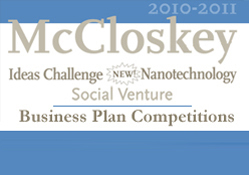
College alumni sitting in a sports stadium or visiting a new city might wonder if any of their classmates are located nearby. If only they had a way to connect easily. How does an alum find, network and connect with other alumni and lost friends in this mobile age?
Now there’s an app for that – or there soon will be.
Huddle Up, a mobile phone application that allows alumni to locate each other within a certain geographic range, is the winner of the 11th annual McCloskey Business Plan Competition, held at the University of Notre Dame April 14 and 15. The team of Notre Dame alums Brett Hummel and Kevin McCuster, along with Coca Astey, took home the grand prize of $20,000.
The application, which uses GPS technology and allows registered users to quickly locate other alums signed on with Huddle Up, targets young alumni aged 21 to 35 who tend to prefer to connect with each other and their alma mater through digital media rather than traditional university publications.
The McCloskey runner-up prize of $5,000 went to Sorian, a wind technology venture. Sorian holds an exclusive license to sell optimization kits for wind-turbine blades that reduce drag and improve performance. The technology currently is being field-tested. The venture also won the Pace Global Best Presentation Award and the Notre Dame Office of Technology Transfer Award, which carries with it a patentability analysis.
The Klau Family Prize for Greatest Social Impact awarded $15,000 to EOS International, a nonprofit that provides rural Nicaraguan communities with low-cost technology aimed at improving health and providing income, including irrigation systems, solar energy and bio-digesters. The Klau prize, formerly known as the Social Venture Competition, offers both nonprofit and for-profit ventures the opportunity to compete for additional prize money if their plans impact a societal or environmental issue.
“Competition was especially intense this year,” said Karen Slaggert, assistant director of the Gigot Center for Entrepreneurial Studies. “The plans covered an impressive spectrum from early cancer detection technology to learning-readiness programs for at-risk children. There also was a strong representation from alumni, undergraduate and graduate students, with ventures representing a range of disciplines on campus, including engineering, science, law, education and business.”
The McCloskey competition awarded more than $100,000 total. Additional prizes included:
- Nanotechnology New Ventures Award: Citrics Biomedical, a maker of a biocompatible bone substitute, earned $5,000 as the best venture involving nanotechnology. Citrics also recently won the inaugural Nanotechnology New Ventures Competition, sponsored by Notre Dame and Purdue University.
- FISH Social Venture R&D Award: The award sponsored by Fellow Irish Social Hub is given to a social venture being incubated at the Innovation Park at Notre Dame. Education Computation received $7,000 in in-kind services, including space rental at Innovation Park for its plan to provide access to technology for students who have been removed from their homes by a state authority and place in a residential treatment program.
The McCloskey Business Plan Competition, sponsored by the Gigot Center at the Mendoza College of Business, is intended for traditional entrepreneurial ventures that have not yet been launched or are at the earliest stage of launch. This is typically defined as ventures that have earned less than $500,000 in cumulative revenue, received less than $500,000 in external financing, and have been in operation for less than three years.
This year, 113 teams entered the competition, beginning in fall 2010. The number winnowed to 12 semifinalists pitching their business plans live before a panel of judges on April 14, with five selected for the finals on April 15. In all, 156 judges and mentors participated in the competition by evaluating entries
and provided the teams with feedback.
The Gigot Center was established in 1998 for the purpose of fostering innovation among current and aspiring entrepreneurs. Through a unique curriculum, business plan competitions and mentoring opportunities with Notre Dame alumni, students gain vital experience and the skills necessary to build successful businesses or to apply entrepreneurship skills within an existing organization.
Contact: Karen Slaggert, assistant director, 574-631-3042, kslagger@nd.edu